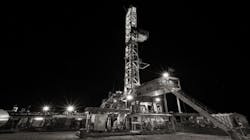Diamondback staying disciplined on production growth
Citing market volatility and an ongoing shortage of parts and people, the leaders of Diamondback Energy Inc., Midland, Texas, are sticking to the in-line-with-2021 production targets they laid out early this year.
“Increasing activity today would result in capital efficiency degradation and would not meaningfully contribute to the global supply and demand imbalance in the oil market today,” Chairman and Chief Executive Officer Travis Stice said in a statement accompanying Diamondback’s first-quarter earnings report. “Therefore, we are focused on maintaining our operational excellence and producing one of the lowest-cost and environmentally friendly barrels in the world.”
In the first 3 months of 2022, Diamondback averaged production of 222,800 b/d and a little more than 381,000 boe/d. For the second quarter and the rest of the year, Stice and his team expect those numbers to be 218,000-222,000 and about 370,000 boe/d, respectively. Their plan calls for Diamondback to add a net 248-267 wells this year and for capital spending to still come around $1.75-1.9 billion. In first-quarter 2022, the latter number was $437 million, just above the low end of the company’s quarterly guidance.
Diamondback produced a net profit of $803 million in the first quarter compared to $223 million in the year-prior period. Revenues more than doubled to $2.4 billion and operating income nearly tripled to $1.66 billion from $571 million as it realized an average sale price of $97.03/bbl from $74.50 in fourth-quarter 2021 and $56.94 in early 2021. That led executives and the company’s board to declare Diamondback’s first-ever variable dividend, a $2.35/share payout that will go out later this month.
On a May 3 conference call with analysts and investors, Stice and President and Chief Executive Officer Kaes Van’t Hof said inflationary pressures for equipment, materials, and workers are helping them make the call to hold the line on production growth and stay focused on internal efficiencies. Ramping up growth plans, they said, would merely reallocate resources from elsewhere in the Permian basin.
“It’s really a zero-sum game,” Van’t Hof said.
Stice added that the energy industry’s supply chains typically adjust to extreme conditions such as today’s but that the process takes time and should be measured in quarters, “if not years.” In the meantime, he said, the Diamondback team will continue to focus on returning capital to investors and lean on tweaking the efficiencies for which the company is known.
“It gets harder in times like today but that doesn’t mean we can’t find differential ways to do more with less,” Stice said.
In addition to holding the line on production growth plans, Stice also was emphatic on the conference call about Diamondback’s plans for a big merger or acquisition. It’s not going to happen anytime soon, he said, despite Diamondback being viewed by some investors as a serial acquirer.
“Large-scale M&A today is quite frankly off the table,” he said. “This remains a seller’s market and we’re not going to underwrite M&A at today’s oil prices just as we’re not going to underwrite buying back stock at today’s oil prices.”
Investors greeted Diamondback’s results with a thumbs up: In late-morning trading May 3, the company’s shares (Ticker: FANG) were up 5% to about $134. Year to date, they have risen about 20%.
About the Author
Geert De Lombaerde
Senior Editor
A native of Belgium, Geert De Lombaerde has more than two decades of business journalism experience and writes about markets and economic trends for Endeavor Business Media publications Healthcare Innovation, IndustryWeek, FleetOwner, Oil & Gas Journal and T&D World. With a degree in journalism from the University of Missouri, he began his reporting career at the Business Courier in Cincinnati and later was managing editor and editor of the Nashville Business Journal. Most recently, he oversaw the online and print products of the Nashville Post and reported primarily on Middle Tennessee’s finance sector as well as many of its publicly traded companies.

